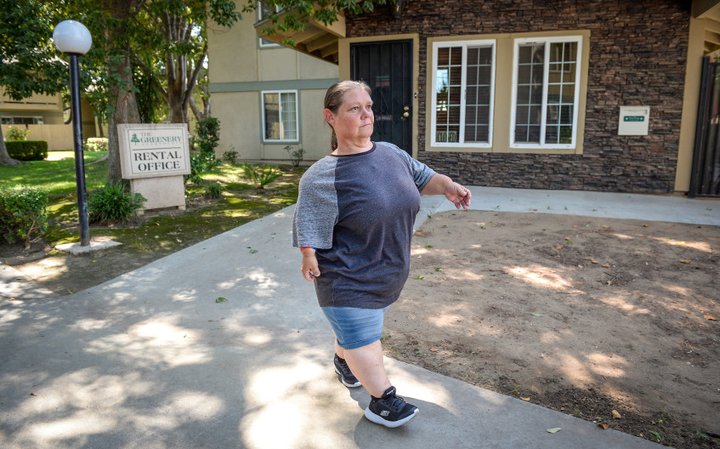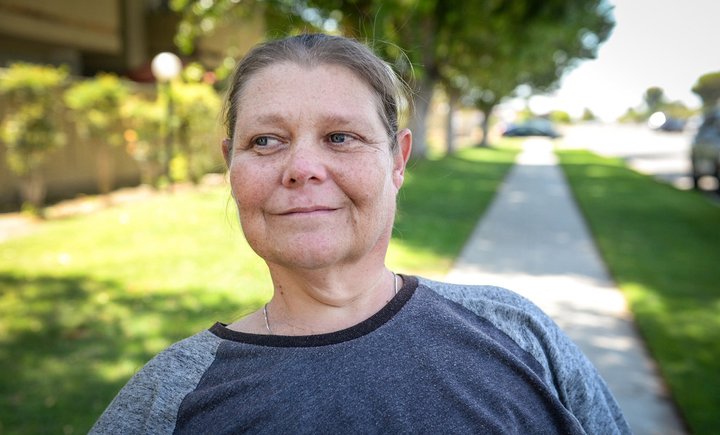Manuela Tobias and Jackie Botts, CALmatters / Thursday, Aug. 29, 2019 @ 7:14 a.m.
Lawmakers Tackle a Severe Housing Shortage for Renters Who Have Federal Vouchers

Fresno resident Reina Richter, who is disabled, has been unable to find housing in Fresno with her Section 8 voucher. She says applicants far outnumber the available housing in the area. Photo by Craig Kohlruss, The Fresno Bee.
###
As California struggles with a crisis in affordable housing, state lawmakers are trying to improve a severe shortage of housing available to renters who have federal Section 8 vouchers.
The vouchers allow tenants to pay only 30% of their income toward rent with federal assistance to pay the rest. But most landlords do not accept tenants who pay with vouchers, saying they are too burdensome.
Meanwhile, applicants can wait years to qualify for the Section 8 vouchers and, when they do, they often can’t find housing before the vouchers expire, usually within 60 days. Last year in Fresno, roughly 17% of the 21,000 people who applied for a voucher got one. But less than half who did found a place before the clock ran out.
“It’s billed as a golden ticket,” said Alexander Harnden, a policy advocate for the Western Center on Law and Poverty. “At this point, I describe it as a ticket to last summer’s movie. If you can find where it’s playing, that’s great. Otherwise it’s just a piece of paper.”
Preston Prince, executive director of Fresno’s housing authority, attributed the trouble in securing housing to multiple factors: rising housing costs, poor credit scores and renting histories, and landlords who refuse to accept Section 8 vouchers.
State lawmakers are weighing two very different remedies to the problem in a state with an intensifying housing crisis that has become a pillar of Gov. Gavin Newsom’s first-year agenda.
One of the bills, introduced by Sen. Anthony Portantino, a La Cañada Flintridge Democrat, would give landlords more incentive to accept Section 8 tenants by providing a tax break equal to 3% of the voucher’s value. The bill is estimated to cost the state $48.5 million over the next three years.
The other bill from Sen. Holly Mitchell, a Los Angeles Democrat, would make it illegal for landlords to discriminate against tenants who receive federal housing vouchers or local housing assistance. Current law prohibits landlords from several categories of discrimination including income. Mitchell’s bill would expand the law to require that landlords accept tenants regardless of whether housing assistance is one of their sources of income. Landlords believed to discriminate would risk lawsuits from the state Department of Fair Employment and Housing.
Both bills are scheduled to be considered Friday in the state Assembly.
Alongside “no smoking” and “no pets,” California landlords often write “No Section 8” in their rental ads on websites like Craigslist and Zillow.
A recent search on Zumper.com, a rental website that includes a Section 8 filter, found fewer than 1% of the more than 16,500 rental postings for Los Angeles, San Diego, San Francisco, Sacramento, San Jose, Fresno and Oakland combined accepted Section 8 vouchers.
The search is even more difficult for units that are priced within the limits of Section 8 vouchers. Voucher holders must find apartments priced within the standard set by their local housing authority, which ranges from 90% to 110% of the Fair Market Rent, a county-wide number set by the U.S. Department of Housing and Urban Development.
Across those same cities, a Zumper search found just one Oakland unit and two Fresno units that accepted Section 8 vouchers among a total of 770 two-bedroom listings that had monthly rents below each city’s Fair Market Rent.
For the last two months, Fresno resident Reina Richter has spent upwards of five hours browsing the internet, calling landlords, and visiting apartment complexes, three to four days a week, to find someone who will take her voucher.
“That ‘No’ is powerful,” said Richter. “It’s detouring. It’s a struggle.”
Richter, who has dwarfism and diabetes, receives disability and supplemental security income from the state.
“I don’t even know how someone would have a full time job and try to find a place,” she said.
She worries about what will happen if she can’t find an apartment in time.
“I would end up homeless. Or maybe I move in with a family member … I don’t know at that point, if I lose my voucher, what I’m going to do.”

Reina Richter says applicants far outnumber the available housing in Fresno. Photo by Craig Kohlruss, The Fresno Bee.
Nicknamed after Section 8 of the federal Housing Act, the Housing Choice Voucher program is the country’s largest low-income housing assistance program, helping about 2.2 million households secure housing in the private rental market. The program was created in the 1970s as an alternative to public housing projects.
However, advocates for the poor say that landlords often reject Section 8 tenants based on racist or class stereotypes.
“It’s gotten so bad that it’s almost completely undermined the initial purpose of the Section 8 program in that it was supposed to allow people that were financially disadvantaged to live in high-resource communities,” said Leah Simon-Weisberg, who leads the tenants rights program at Centro Legal de la Raza in Oakland.
“In the same way it’s unacceptable to say ‘No Jews’…, it has to be equally unacceptable to say ‘No Section 8.’”
Landlord and real estate lobbies oppose Mitchell’s bill because they say the red tape required to work with federal agencies is burdensome and can cost money through vacancies.
Greg Terzakis, senior vice president of the California Apartment Association, said it can take weeks to get inspections, which are required before units can qualify for Section 8 vouchers. He also said the federal money is sometimes late. Plus, Section 8 requires a one-year lease while some landlords prefer month-to-month contracts.
“Normally, renters give you an application, you run a background check, credit, say yes or no and you’re done,” he said. “But with Section 8, there’s an additional paperwork packet. You have to take it to the housing authority, once it’s reviewed they have to send you a letter telling you when the inspection is going to be.”
Fresno’s Housing Authority acknowledged the process can be difficult.
“There may be some inconsistencies on our part. Those are things we are working on through monitoring and training. We hear them,” said Angie Nguyen, chief of staff at the Fresno Housing Authority.
Portantino’s bill attempts to address landlords’ concerns. If passed together, the two pending bills could represent a comprehensive solution, he said.
“Section 8 -- It’s real money, it’s valid resources,” he said. “There’s really no reason not to take it. I think reminding the landlords that there’s no reason not to take it and then providing them an incentive for taking it, that’s a complementary approach.”
A handful of local governments have seen improvement after passing incentives similar to those proposed by Portantino’s bill, sometimes in conjunction with discrimination bans.
In 2016, Marin County offered up to $3,000 to protect landlords from income loss due to vacancies or property damage related to Section 8 tenants, and passed a ban on voucher discrimination.
The rate at which Marin voucher holders found rentals before their vouchers expired nearly doubled, from 30% in 2015 to 60% in 2018. Costs have been a problem, however, according to a HUD report published this year. And rent increases in the area have prevented the housing authority from issuing any new vouchers.
Several local governments have also approved bans on voucher discrimination similar to the state proposal in Mitchell’s bill including Santa Clara County, San Francisco, San Diego and Berkeley. Los Angeles and San Jose passed similar protections this summer.
The Berkeley ban, passed in 2017 has had little impact because the city didn’t invest in landlord education or enforcement, according to Simon-Weisberg, who also serves on the Berkeley housing advisory commission. San Francisco’s ban is more effective because the city attorney has proactively sued landlords, sending a strong message across the city, Simon-Weisberg said.
But in both cities, online rental postings that explicitly don’t accept Section 8 vouchers abound, despite the local laws.
In other parts of the country, research indicates the discrimination law change has had more impact. Just 31% of screened rental ads denied vouchers in Newark, New Jersey, where a statewide anti-discrimination law has been in place since 2002, compared to 76% in Los Angeles, according to a 2018 Urban Institute study commissioned by HUD. The rate was just 15% in Washington, D.C.
Sen. Mitchell says that outlawing voucher discrimination won’t solve the shortage of landlords who take Section 8, but it will make a worthwhile dent.
“The whole point of this bill is, give me a shot. It doesn’t mandate that you accept Section 8. But it does say, stop disallowing me from even applying,” Mitchell told CalMatters’ Matt Levin and Los Angeles Times’ Liam Dillon on this week’s episode of “Gimme Shelter: The California Housing Crisis Podcast.”
###
Manuela Tobias is a journalist at The Fresno Bee. Jackie Botts is a journalist at CalMatters. This article is part of The California Divide, a collaboration among newsrooms examining income inequity and economic survival in California. CALmatters.org is a nonprofit, nonpartisan media venture explaining California policies and politics.
CLICK TO MANAGE